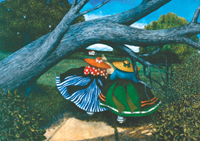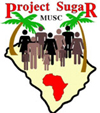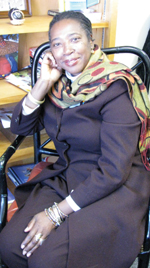|
|
|

|
The Gullah Connection
|
Community-based
research aids Sea Islands population
By Dawn Brazell
Public Relations
When there’s a genetic goldmine in a community as special as the Sea
Islanders, there’s a heavy responsibility to value and protect it.
That’s what drew Ida Johnson-Spruill, Ph.D., R.N., back to MUSC when
she finished her graduate work. She felt compelled to return home
because she missed working with the Gullah community. Going away gave
her perspective on the rare and special opportunity of doing genetic
research with this distinct population that was isolated from the
mainland for many years, she said.
In conjunction with the Citizen Advisory Community (CAC), she is
planning a tribute to be held this summer to commemorate the
accomplishment of work that began in 1995 with Project SuGAR (Sea
Island Genetic African American Family Registry), which is a MUSC
community-based research study conducted from 1995 to 2004 focusing on
Gullah families affected by Type 2 diabetes.
The goal was to establish a world-class family registry and DNA bank of
Sea Island families to identify genetic defects or mutations
responsible for expression of complex diseases. Another goal that has
worked out beautifully was to
develop long-term collaborations with people and institutions on the
Sea Islands to promote preventative health, she said.
 The image is
“Cousins” by Jonathan Green from the 2008 MOJA Arts Festival. Project
SuGAR used cultural events in its community-based research to
strengthen community ties. The image is
“Cousins” by Jonathan Green from the 2008 MOJA Arts Festival. Project
SuGAR used cultural events in its community-based research to
strengthen community ties.
That goal has grown beyond what anyone expected.
Frederica Hughes, R.N., a research nurse who is part of the community
and who also worked with the project for several years, said the
project just seemed to grow a life of its own. “It became bigger than
any of the people who started it,” she said.
It served as a catalyst and became an important component of the Sea
Islands Families Project (SIFP), which represents a broader effort to
identify genes that cause complex or polygenic diseases in
African-Americans. SIFP includes such groups as the Center of
Biomedical Research Excellence (COBRE) for Oral Health at MUSC and the
Systemic Lupus Erythematosus in Gullah Health (SLEIGH) Study.
 One goal of
Project SuGAR was to enroll 400 African-American families with Type 2
diabetes, but the group ended up enrolling 652 families. Prior to
Project SuGAR, there was little information or research regarding
candidate genes contributing to the expression of Type 2 diabetes in
African-Americans. That changed when study findings located the genome
region contributing to diabetes among the Gullah population to be on
the long arm of chromosome 14. One goal of
Project SuGAR was to enroll 400 African-American families with Type 2
diabetes, but the group ended up enrolling 652 families. Prior to
Project SuGAR, there was little information or research regarding
candidate genes contributing to the expression of Type 2 diabetes in
African-Americans. That changed when study findings located the genome
region contributing to diabetes among the Gullah population to be on
the long arm of chromosome 14.
Spruill said this is an ideal research population for genetics because
African-Americans living on the Sea Islands of South Carolina are
characterized by a low degree of non-African genetic admixture and high
rates of Type 2 diabetes and diabetic complications. The genomewide
linkage scans were the first to be conducted in this population. It
revealed regions contributing to diabetes among the Sea Islanders that
are different from discoveries in other populations.
Spruill said these findings are exciting in that they may have
implications for medical interventions and personalized medicine.
The same is true of the studies in systemic lupus that are a part of
the SLEIGH Study done by Diane Kamen, M.D., and Gary Gilkeson, M.D.
They found that the familial prevalence of lupus on the Sea Islands is
significantly higher than in other communities where lupus has been
studied. This means that it is more likely that there is more than one
person with lupus in a family in the Sea Islands as compared to other
parts of the country, a finding that suggests genetics plays a bigger
role in who gets lupus locally. One of the study’s goals is to
determine the genes that cause lupus. The investigators were also
recently funded by the National Institutes of Health to explore
environmental triggers of autoimmunity, in partnership with the Sea
Island Gullah community.
Other areas of research interest include studying obesity and breast
cancer in this population, by Hollings Cancer Center Prevention and
Control. One advantage of the CAC/Sea Island Families Project is that
the group can be a gatekeeper for Sea Islanders as research among this
population grows in popularity. Researchers are finding that at the
molecular level some people tend to respond to disease and medications
differently and that genetic variations or make up can make significant
differences. It sets the stage for epigenetic and pharmacogenetics or
the study of how genes influence an individual’s response to drugs and
interaction with the environment.
It’s not a coincidence that research has flourished in this area,
Spruill said. Time was spent developing relationships, with many health
care providers, attending annual cultural events and conducting health
screenings.
“If you embrace the community, provide a service, show respect and
include the community in your planning, delivery and dissemination,
they will embrace you and your work. Project SuGAR was embraced by the
Sea Islands and this made the project successful.”
 Dr. Ida Spruill
found Project SuGAR has opened up research while
protecting a vulnerable population. For information on Project SuGAR,
visit http://academicdepartments.musc.edu/sugar. Dr. Ida Spruill
found Project SuGAR has opened up research while
protecting a vulnerable population. For information on Project SuGAR,
visit http://academicdepartments.musc.edu/sugar.
The experience has changed her, she said. “We learn tolerance. We learn
respect for others, and the Gullah culture. Just because people look or
speak a certain way, you cannot or should not ascribe a behavior to
them. You learn to treat people as individuals.
Hughes said it also has had a profound effect on her.
“It was awesome. Ida had us embrace our Gullah culture. I am from Johns
Island and always thought we were special,” she said, recalling how she
tended to downplay her cultural ties when she was younger and attended
a school with mostly white people. “After Project SuGAR, I knew I could
embrace it.”
As a nurse educator and recruiter, she said she enjoyed the community
outreach involved with her work that included using the findings of the
genetic research to encourage preventative health. She found a
significant deficit in what they needed to know about nutrition and
wellness. The focus was not only treating an illness already there, but
also about educating the next generation, she said.
“MUSC is about excellence, and part of excellence is giving them
knowledge. Giving them knowledge is power.” Hughes, who also
participated in the study along with her mother, said all her
background reading on diabetes and obesity made her decide to make
personal changes as well, especially given her genetic predisposition
for diabetes and obesity. She’s changed her diet, lost 50 pounds and
exercises regularly. Though the recruitment part of Project SuGAR has
ended, she’s still out in the community attending cultural events and
health fairs to encourage healthy lifestyles, she said.
Spruill is, too, especially given how much exciting research is in the
works.
“It’s important for African-Americans to participate in research,
especially genetic research because our ancestral origins may affect
genetic variation or cause us to respond differently to some
medications and treatment. Participation in research will help us
develop new targeted drugs and better treatment that may work for us
because we participated in the studies and clinical trials. That’s the
beauty of genetic research and Project SuGAR.”
Spruill will be researching how attitudes and cultural beliefs in Sea
Islanders affect decision-making and if knowledge of a genetic
susceptibility will influence health behaviors.
Project SuGAR broke new ground in that it was the first Lowcountry
study on genetics with a population that historically did not
participate in research. “We’re indebted to the Sea Islands and so
grateful for the people who have been willing to participate,” she
said. “It is time to say ‘thank you’ to the Sea Islanders. It is time
to share our findings with the community.”
She anticipates a celebration date to be set by CAC/ SIFP in early
August.
“MUSC should celebrate genetic research in the Lowcountry and be proud
of the accomplishments. It’s time for a celebration. It’s been a MUSC
family affair, and it’s far from being over. There are so many other
studies that are coming out of this. I’m not finished yet,” she said, a
broad grin breaking out.
“I’m so far from done.”
Friday, Feb. 18,
2011
|
|
|




 One goal of
Project SuGAR was to enroll 400 African-American families with Type 2
diabetes, but the group ended up enrolling 652 families. Prior to
Project SuGAR, there was little information or research regarding
candidate genes contributing to the expression of Type 2 diabetes in
African-Americans. That changed when study findings located the genome
region contributing to diabetes among the Gullah population to be on
the long arm of chromosome 14.
One goal of
Project SuGAR was to enroll 400 African-American families with Type 2
diabetes, but the group ended up enrolling 652 families. Prior to
Project SuGAR, there was little information or research regarding
candidate genes contributing to the expression of Type 2 diabetes in
African-Americans. That changed when study findings located the genome
region contributing to diabetes among the Gullah population to be on
the long arm of chromosome 14.